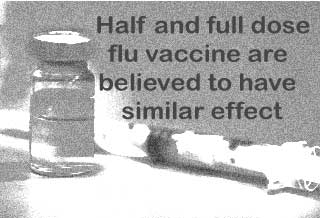
This randomized clinical trial was conducted by Renata J. M. Engler, M.D., of the Walter Reed Army Medical Canter, Washington, and colleagues. They studied adults ranging from 18 to 64 years of age. Within a month, more than 500 adults were given a full dose of trivalent inactivated influenza vaccine. Around the same number of adults were given half a dose of the same vaccine. All the participants had given blood samples before and 21 days after vaccination, they were also tested for antibodies against influenza and also their experienced symptoms within this time period, if any, were recorded.
The trial authors say that, “Antibody responses to intramuscular half-dose trivalent inactivated influenza vaccine in healthy, previously immunized adults were not substantially inferior to the full-dose vaccine, particularly for ages 18 to 49 years.†It also stated that the rate of medical visits related to respiratory or cardiovascular reasons were the same for both the half dosage received adults and full dosage received adults.
The authors say that this can be useful in a time when there is vaccine shortage, especially at a local level where vaccine supply delivery can get delayed. It is also stated that half doses actually reduce the amount of side effects. Thus this could be an added advantage, because reducing dosage will be more acceptable to people who face adverse vaccine related side effects.
The author’s say that, “As recommendations for influenza immunization expand and evidence that elderly persons (men older than 60 years) may require higher doses of vaccine for optimal responses, reduced doses in healthy, younger populations may become a valuable national strategy.â€
It’s said that women responded more to both the vaccine doses, than men. Women, who received half a dose of vaccine, had similar antibody responses, as the men who received a full dosage. Thus, the trial suggests that age and sex should be taken into consideration before vaccination during shortage.
This clinical trial is published in one of JAMA/Archives journals, the Archives of Internal Medicine issue.
